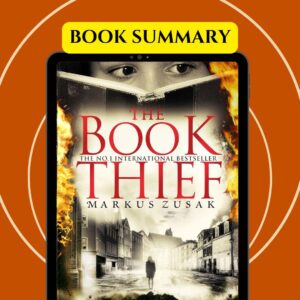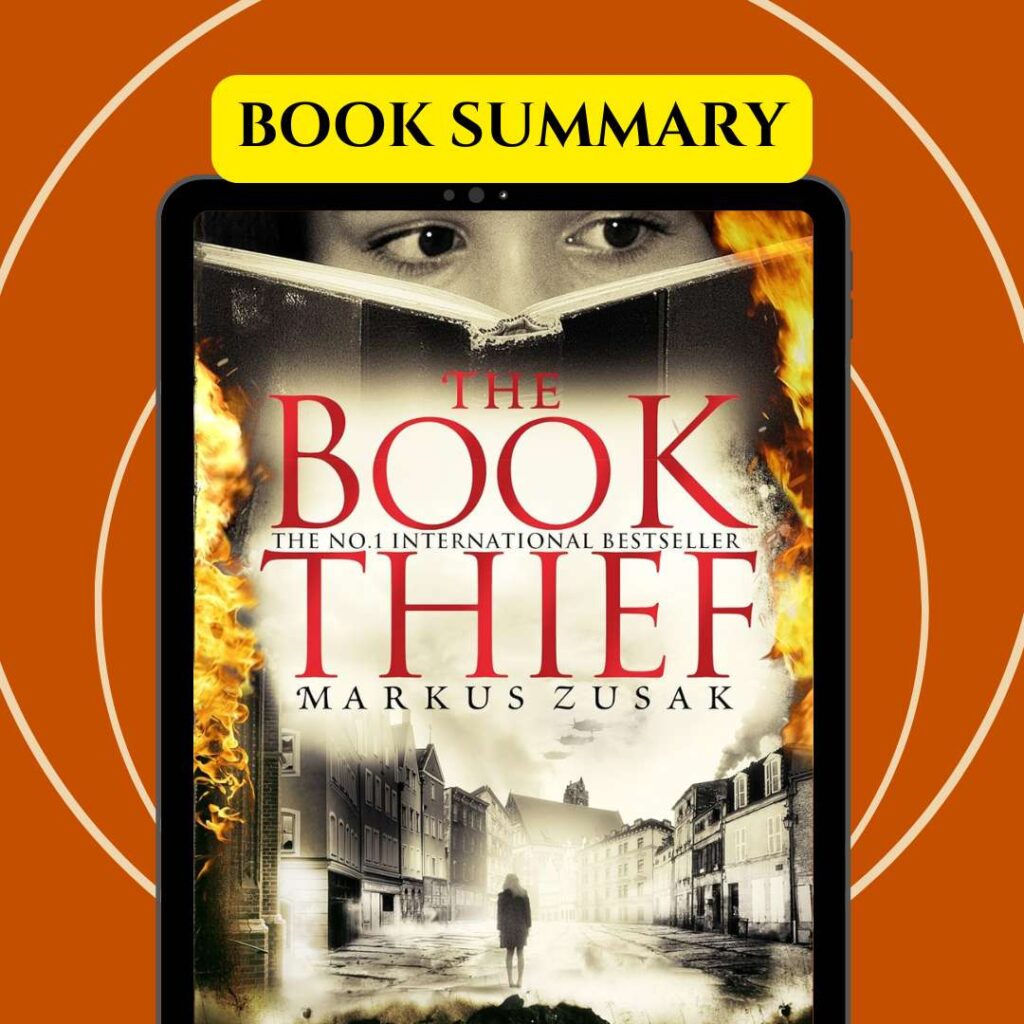The Book Thief Book Summary: A Timeless Tale of Love, Loss, and the Power of Words
The Book Thief by Markus Zusak is a captivating and poignant novel set against the backdrop of Germany during World War II. This compelling narrative has garnered immense popularity and critical acclaim for its unique storytelling and profound themes.
The Popularity and Critical Acclaim
- The Book Thief has resonated with readers worldwide, selling millions of copies and earning numerous accolades.
- Renowned for its emotional depth and powerful narrative, the book has received widespread praise from critics and readers alike.

Table of Contents
Author’s Background
Markus Zusak possesses a remarkable writing career that has garnered him global recognition.
Overview of Markus Zusak’s Background
- Zusak, born in Australia, comes from a family of storytellers.
- His diverse literary works showcase a deep understanding of human emotions and experiences.
Setting
The historical setting of The Book Thief immerses readers in the tragic reality of Germany during World War II.
Germany During World War II
- The backdrop of war serves as a harrowing yet compelling setting that shapes the characters’ lives.
- The grim reality of the era adds a layer of depth and authenticity to the narrative.
Main Characters
The characters in The Book Thief are richly developed, each contributing to the overarching themes of the story.
Protagonist Liesel Meminger and Key Characters
- Liesel Meminger: A young girl whose bond with books becomes her solace amidst the turmoil of war.
- Hans and Rosa Hubermann: Liesel’s foster parents who provide her with love and support in challenging times.
- Max Vandenburg: A Jewish man hidden by the Hubermanns, whose friendship with Liesel is a beacon of hope.
Plot Summary – Part 1
The initial events of the story lay the foundation for Liesel’s journey of resilience and love.
Liesel’s Arrival in Molching and Relationship with the Hubermanns
- Molching: The small town where Liesel is taken in by the Hubermanns, marking the beginning of her tumultuous yet transformative experiences.
- Hans and Rosa: The Hubermanns’ unique dynamic shapes Liesel’s understanding of family and compassion.
Plot Summary – Part 2
Liesel’s interactions with Max Vandenburg unfold a poignant tale of friendship and resilience.
Liesel’s Bond with Max Vandenburg
- Max Vandenburg: The Jewish man in hiding who forges a profound connection with Liesel.
- Acts of Kindness: Liesel and Max’s relationship transcends cultural boundaries, showcasing the power of empathy and human connection.
Major Themes
The Book Thief delves into profound themes that explore the complexities of human emotions and relationships.
Exploration of Themes
- Love and Loss: The novel poignantly depicts the enduring power of love amidst the backdrop of loss and tragedy.
- Friendship and Resilience: Liesel’s relationships underscore the resilience of the human spirit in the face of adversity.
- Power of Words: The significance of storytelling and literature as a tool for healing and empowerment.
Symbolism
The use of symbolism in The Book Thief adds layers of meaning and depth to the narrative.
Significance of Imagery and Symbols
- Books and Words: Symbolize the power of storytelling and the ability to preserve memories and emotions.
- The Accordion: Represents the harmony and discord of human experiences in times of turmoil.
Importance of Death
The character of Death serves as a unique narrator, offering a distinctive perspective on life and mortality.
Role of Death in the Narrative
- Narrative Voice: Death’s narration reflects a profound contemplation on the fragility and beauty of life.
- Symbolic Presence: Death’s omnipresence underscores the inevitability of mortality and the interconnectedness of all beings.
Impact of World War II
The looming shadow of World War II shapes the characters’ experiences and choices throughout the narrative.
Influence of the War
- Permeating Fear: The war instills a sense of constant fear and uncertainty, echoing in the characters’ everyday lives.
- Resilience and Hope: Despite the turmoil, the characters find moments of resilience and hope amidst the chaos.
By delving into the intricate tapestry of characters, themes, and symbolism in The Book Thief, readers embark on an emotionally stirring journey that resonates long after the final page.
Turning Points
In The Book Thief, Liesel Meminger experiences several key turning points that shape her journey and the overall narrative:
Discovery of the Power of Words
- Liesel’s discovery of the power and magic of words through her stolen books marks a significant turning point in her life.
- This newfound passion for reading not only provides solace but also becomes a source of strength and resilience.
Friendship with Max Vandenburg
- Liesel’s bond with Max Vandenburg, the Jewish man hidden by the Hubermanns, symbolizes hope and compassion in the midst of war.
- Their friendship deepens as Liesel reads to Max, fostering mutual understanding and a shared sense of humanity.
Loss and Grief
- The devastating loss of loved ones, including her foster family and friends, forces Liesel to confront profound grief and navigate the complexities of mourning.
- These experiences of loss propel Liesel towards maturity and a deeper understanding of the harsh realities of life.
Acts of Defiance and Courage
- Liesel’s acts of defiance against the oppressive regime and her brave efforts to protect those she loves demonstrate her courage and inner strength.
- These moments of defiance against injustice showcase Liesel’s unwavering resilience and determination in the face of adversity.
Emotional Resonance
The Book Thief resonates with readers on an emotional level, evoking a profound range of feelings and connections:
Empathy and Compassion
- Markus Zusak’s poignant storytelling engenders a sense of empathy and compassion among readers, fostering a deeper understanding of human suffering and resilience.
- The emotional depth of the narrative prompts readers to reflect on themes of loss, love, and the enduring power of human connection.
Heartfelt Relationships
- The heartfelt relationships depicted in the book, from Liesel’s bond with Max to her affection for Rudy Steiner, resonate with readers and evoke a sense of longing and warmth.
- These emotional connections between characters create a rich tapestry of human experiences and emphasize the profound impact of personal relationships.
Cathartic Release
- Through its exploration of grief, love, and survival, The Book Thief offers readers a cathartic release, allowing them to process complex emotions and find solace in shared experiences.
- The emotional resonance of the story invites readers to immerse themselves in Liesel’s journey and contemplate the enduring power of resilience and hope.
Narrative Style
Markus Zusak’s narrative style in The Book Thief is characterized by its unique structure and the unconventional choice of Death as the narrator:
Unconventional Narrator
- The use of Death as the omniscient narrator infuses the story with a haunting and philosophical perspective on human existence and mortality.
- Death’s introspective observations provide a unique lens through which to view the events of the novel, adding depth and complexity to the narrative.
Symbolic Imagery
- Zusak’s vivid and symbolic imagery enhances the narrative, conveying themes of life, death, and the enduring power of storytelling.
- The juxtaposition of stark realism with poetic prose creates a compelling and evocative reading experience that resonates with readers.
Nonlinear Structure
- The nonlinear structure of the novel, interspersed with various asides and reflections, adds layers of complexity to the storytelling and invites readers to engage with the narrative on multiple levels.
- This narrative technique enriches the reading experience and enhances the thematic depth of the story.
Critically Acclaimed
The Book Thief has garnered widespread critical acclaim for its powerful storytelling and thematic richness:
Literary Praise
- Critics and readers alike have lauded Markus Zusak’s masterful storytelling and lyrical prose, hailing The Book Thief as a modern classic of historical fiction.
- The novel’s intricate plotting, compelling characters, and evocative themes have earned acclaim for its ability to captivate and engage audiences.
Awards and Recognition
- The Book Thief has received numerous prestigious literary awards, including the Michael L. Printz Honor and the Kathleen Mitchell Award for Young Adult Fiction.
- Its universal themes of love, loss, and resilience have resonated with audiences worldwide, solidifying its place as a beloved and enduring work of literature.
Adaptation
The film adaptation of The Book Thief brought Zusak’s poignant narrative to the silver screen, eliciting mixed responses from audiences and critics:
Film Interpretation
- The film adaptation of The Book Thief sought to capture the emotional depth and thematic resonance of the novel, presenting a visual reimagining of Liesel’s journey.
- While praised for its performances and visual aesthetics, the adaptation garnered some criticism for its narrative pacing and deviations from the source material.
Reception
- Audiences expressed varying opinions on the film adaptation, with some appreciating its faithfulness to the novel’s emotional core and others noting discrepancies in character portrayals and plot developments.
- Despite mixed reviews, the film adaptation of The Book Thief served as a visual tribute to Zusak’s compelling story and introduced new audiences to the world of Liesel Meminger.
Legacy
The Book Thief continues to leave a lasting legacy in the literary landscape, resonating with readers and influencing contemporary storytelling:
Enduring Themes
- The enduring themes of love, loss, friendship, and the power of words in The Book Thief have inspired a new generation of readers and writers.
- Its poignant exploration of humanity’s capacity for both cruelty and kindness remains a timeless and relevant reflection on the complexities of human nature.
Cultural Impact
- The cultural impact of The Book Thief transcends its initial publication, with the novel sparking discussions on memory, resilience, and the enduring legacy of history.
- Its narrative depth and emotional resonance have solidified its status as a celebrated work of literature that continues to provoke thought and reflection.
Inspirational Influence
- The Book Thief serves as an enduring source of inspiration for authors and storytellers, influencing the portrayal of war, loss, and human connection in contemporary fiction.
- Its legacy as a powerful and poignant narrative underscores its significance in shaping the literary landscape and resonating with diverse audiences worldwide.
Recommended Reading
For readers who enjoyed The Book Thief and are seeking similar themes and settings, consider exploring the following titles:
Additional Historical Fiction Novels
- The Nightingale by Kristin Hannah: A compelling story of love, sacrifice, and bravery set against the backdrop of World War II.
- All the Light We Cannot See by Anthony Doerr: A poignant tale of survival and resilience amid the chaos of the war-torn world.
Coming-of-Age Stories
- To Kill a Mockingbird by Harper Lee: A classic tale of morality, justice, and childhood innocence in the American South.
- The Catcher in the Rye by J.D. Salinger: An iconic exploration of teenage angst and alienation in post-World War II America.
FAQs about The Book Thief
What is the main theme of The Book Thief?
The main themes of The Book Thief revolve around love, loss, friendship, and the power of words in the midst of World War II.
Who is Liesel Meminger in The Book Thief?
Liesel Meminger is the protagonist of the book, a young girl who finds solace in books and words during a time of great turmoil.
How does the setting of World War II impact the story in The Book Thief?
The backdrop of World War II shapes the characters’ lives and choices, reflecting the harsh realities of the time.
What role does Death play as the narrator in The Book Thief?
Death serves as a unique narrator, offering a poignant and reflective perspective on the events unfolding in the story.
What are some key turning points in Liesel’s life in The Book Thief?
The story of Liesel is driven by pivotal moments that shape her character and journey, showcasing her resilience and strength.
How has The Book Thief been received by critics and readers?
The Book Thief has garnered critical acclaim for its emotional depth, engaging narrative style, and profound themes.
Are there any films based on The Book Thief?
Yes, there is a film adaptation of The Book Thief which further brings the story to life on the big screen.
Conclusion:
In conclusion, The Book Thief by Markus Zusak stands as a captivating tale set against the backdrop of World War II, weaving together themes of love, loss, and the enduring power of words. Through the eyes of Liesel Meminger and the unique perspective of Death as the narrator, the story evokes profound emotions and leaves a lasting impact on readers. As a critically acclaimed work with a compelling narrative style, The Book Thief continues to resonate with audiences and solidify its place as a timeless piece of literature.
Discover marketing services, interviews & publishing tools at SharingStories.



